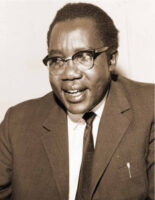Dr Joseph Gordon Odero-Jowi is best remembered for all the wrong reasons. He hardly made an impact on the political arena.
He was the Ndhiwa MP between 1969 and 1974 on a Kanu ticket, when Nyanza was an opposition zone, dominated by Odinga’s KPU.
President Kenyatta’s appointment of Odero-Jowi to the Cabinet did not make matters better for him. He stepped into the shoes of Mboya, the slain Minister for Economic Planning and Development. It was claimed that he had been compromised to appease his community.
Odero-Jowi had previously served as an Assistant Minister for Finance and had defended the Government whenever the Opposition attacked it. In his contribution during the debate on a motion of adjournment on December 22, 1967, Odero-Jowi said: “The country has done well and we must thank the leadership of Mzee Jomo Kenyatta for giving this country the political stability which has enabled this Government to perform miracles.”
Showering the Government with more praise, he singled out the social services as exemplary, and said that the effort the Government put into self-help work had given birth to schools which would have taken years to build. “I think we must give this Government credit where it is due for giving inspiration and providing the leadership which has enabled the citizens to do these things,” he stated. Turning to the Opposition, Odero-Jowi asserted: “All the propaganda and lies from the Opposition are now dying out!” Taken to task by Butere MP Martin Shikuku on the claims, the Ndhiwa MP stood his ground, saying the Opposition had indulged in propaganda and fed it to the public. He made a passionate appeal to the Opposition to abandon what he described as “futile efforts to divide the citizens of this country”. There was no doubt that the Assistant Minister was loyal to Kenyatta: “I can see a few heads ruffled, but I maintain that the Opposition has no room as long as the leadership of this country is acceptable. It is impossible for an opposition party to make headway as long as the people have confidence in the President.”
Odero-Jowi made history as Kenya’s first politician to win a closely fought election and then abandon his electorate for greener pastures abroad after the 1974 election. He was said to have been frustrated when Kenyatta did not appoint him to the Cabinet.
He was in a dilemma: To please the electorate who adored the Opposition or the Government blamed for Mboya’s assassination, frustrating Odinga, banning the KPU and detaining its MPs on security grounds.
Another Nyanza politician in such a fix because of the cold war between Kenyatta and Odinga was Kasipul-Kabondo’s Samuel Onyango Ayodo, the Local Government Minister from 1963 to 1969. In June, 1963, the India-trained economist and former principal of the African Labour College in Kampala, Dr Joseph Gordon Odero-Jowi won the Lambwe (as Ndhiwa was then known) parliamentary seat on a Kanu ticket. At the time, under the Lancaster House Constitution, Kenya had a tri-cameral Parliament — the National Assembly, the Senate and the Regional Assembly. The latter two were abolished through parliamentary constitutional amendments.
A new constituency, Mbita, was carved out of Lambwe in 1965. Odero-Jowi switched to the new Ndhiwa constituency, and Senator Mbeo Onyango became the MP for Mbita. Odero-Jowi lost his seat in a bruising election campaign in 1969, when he was serving as the Minister for Economic Planning and Development, which he had inherited from Mboya.
In that election, the Luo voted against all Kanu candidates. Matthews Otieno Ogingo, a former vice-chairman of the Nyanza Regional Assembly, trounced Odero-Jowi in a controversial contest. But Odero-Jowi challenged the victory in court. The election was nullified. In the repeat election, Ogingo again beat Odero-Jowi and with a larger margin. Kenyatta appointed Odero-Jowi Kenya’s permanent representative to the United Nations, where he served between 1972 and 1974 and was instrumental in bringing the UNEP headquarters to Nairobi. He returned to Kenya before the 1974 General Election and recaptured the seat, beating Ogingo and seven other candidates hands down on a Kanu ticket. But he did not complete his tenure. He left to join a UN agency in Canada in 1977. Once again, a by-election was called and a former senior police officer, Zablon Olang’, won.
